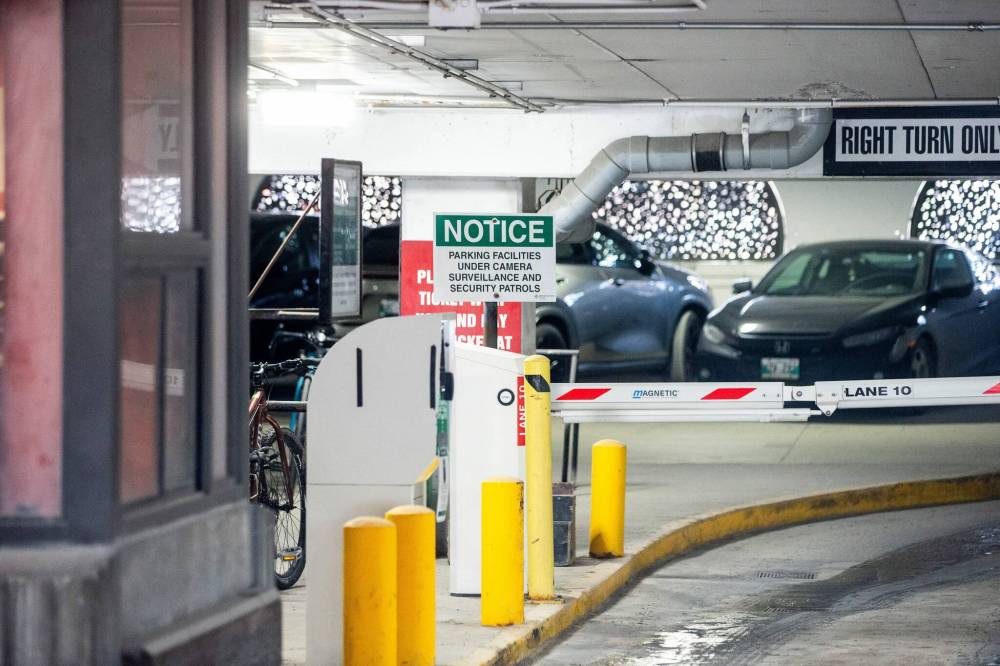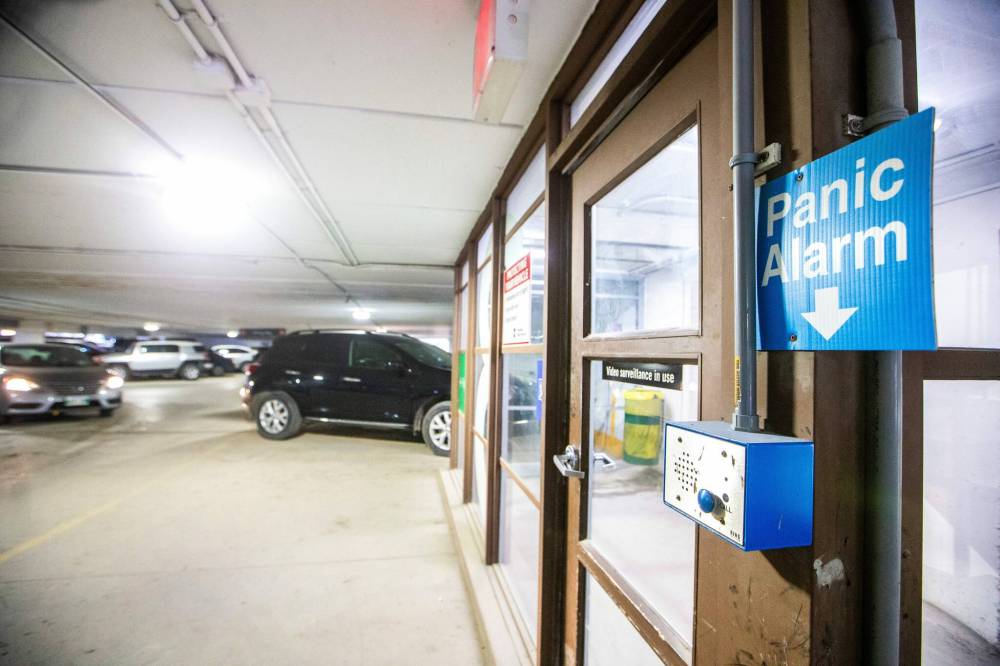Arbitrator sounds alarm over HSC safety, gives Shared Health month to fix problems
Read this article for free:
or
Already have an account? Log in here »
To continue reading, please subscribe:
Monthly Digital Subscription
$19 $0 for the first 4 weeks*
- Enjoy unlimited reading on winnipegfreepress.com
- Read the E-Edition, our digital replica newspaper
- Access News Break, our award-winning app
- Play interactive puzzles
*No charge for 4 weeks then billed as $19 every four weeks (new subscribers and qualified returning subscribers only). Cancel anytime.
Read unlimited articles for free today:
or
Already have an account? Log in here »
Staff at Health Sciences Centre face an “unacceptable level of risk” in exterior areas of the hospital campus, an arbitrator has concluded in a highly critical 40-page decision.
In the document released earlier this week, Kris Gibson has given Shared Health, the provincial authority responsible for HSC, 30 days to create a safety plan.
The president of the Manitoba Nurses Union, which filed a grievance last June on behalf of members concerned about dangers in and around HSC parking facilities, was pleased the arbitrator agreed, and took aim at Shared Health officials.
Who’s patrolling the Health Sciences Centre?
Security Guards for Access Control: are posted at entrances to the hospital facilities to “observe, deter and report”and are provided by Garda Security Services. Since last summer, SGACs have been stationed around the clock at the three southern parkades, including the Tecumseh and Emily lots and one at J Lot. The guards aren’t expected to intervene but to contact HSC security for assistance.
Security Guards for Access Control: are posted at entrances to the hospital facilities to “observe, deter and report”and are provided by Garda Security Services. Since last summer, SGACs have been stationed around the clock at the three southern parkades, including the Tecumseh and Emily lots and one at J Lot. The guards aren’t expected to intervene but to contact HSC security for assistance.
Qualified Persons: can take custody of mental-health patients from law enforcement and deal with people in mental-health crisis. The HSC employs 15 QPs around the clock with additional training in non-violent crisis intervention, de-escalation of situations and in protecting staff and patients. QPs carry handcuffs and can arrest and detain in circumstances where they witness an offence taking place. Detention is subject to reasonable time frames and is done in anticipation of the arrival of Winnipeg police. (Starting Monday, the first of a dozen specially-trained institutional safety officers will start work at the HSC and are authorized to carry pepper gel and handcuffs).
Two vehicular patrols: known as Xray 1 and Xray 2 patrol the outdoor parkades and lots 24-7. One guard is in each vehicle. They provide the initial response to issues in the parkades and rides to HSC staff who contact security for an escort to transit stops or vehicles parked on campus.
Two security supervisors: are present at all times; one is employed by HSC and the second is provided by Garda to supervise the Garda SGACs. HSC has two monitoring rooms and three operators to observe images captured by security cameras. One monitoring room answers calls to HSC security and, if necessary, dispatches personnel.
Darlene Jackson expressed frustration over the “shameful” lengths the union and its members have had to take to get the authority’s attention to protect front-line workers, patients and their families.
A separate arbitration panel is to address issues of workplace safety inside HSC buildings, Jackson said.
The arbitrator’s report (the full decision is available at wfp.to/yqk) includes evidence of “egregious instances of vandalism” to personal vehicles in HSC parking areas with multiple windows broken and “perpetrators bleeding profusely in the interior of the vehicle,” and repeat vandalism and theft targeting the same vehicle.
Witnesses described their experiences in parkade stairwells and lobbies with individuals who were “camping,” using drugs and/or alcohol, “leaving biohazardous garbage and waste, and using those areas to relieve themselves.”
There was a physical assault on a nurse attempting to enter a staff entrance to HSC on March 27, 2023. The nurse suffered a variety of physical and non-physical injuries and remained on worker’s compensation almost a year later, the arbitrator wrote.
Evidence included Winnipeg Police Service crime data showing the area containing the HSC campus has the third-highest rate of both violent crime and overall crime in the city.
The arbitrator ruled that HSC’s employee “self-help” instructions — to use the tunnel system, the “Safe Walk” escort program and a personal alarm — are not sufficient to mitigate the risks they face moving around the hospital campus.
Options available to staff heading to or from bus stops or their vehicles included suggestions from the employer to walk in groups and be vigilant. They could also carry workplace-supplied personal alarms that emit a loud noise when triggered, both to deter an approach or attack and attract the attention of security personnel or others who might help.
However, if there is no one in the area to help and the deterrent effect doesn’t work, the alarms won’t prevent or mitigate an attack, the report said.
MIKAELA MACKENZIE / FREE PRESS “That’s something that we have been fighting for, because the William Parkade is extremely unsafe for anyone — not just staff — for anyone in that parkade,” Darlene Jackson said.

The other two options include using the HSC tunnel system that’s equipped with panic buttons and monitored cameras and the “Safe Walk” program. It involves a ride to or from transit stops or parked personal vehicles from security patrols when one is available; there are waits of up to a half-hour for the service.
Gibson acknowledged there had been security improvements for parking on the south side of the campus, but said there remains an “unacceptable level of risk to the safety of employees” at the William Avenue parkade on the north side.
Shared Health has 30 days from her April 9 decision to address the issue.
“That’s something that we have been fighting for, because the William Parkade is extremely unsafe for anyone — not just staff — for anyone in that parkade,” Jackson said.
In a statement, Shared Health said a broader campus safety plan — including security upgrades to the William Avenue parkade — are in the works and that it is working to ensure “appropriate levels of protection for everyone providing, and receiving, care on our campus.”
It pointed to “extensive upgrades” in and around the HSC, including improved campus lighting to make it brighter and safer. Shared Health said patrols have been increased, video monitoring has been enhanced and has taken steps to ensure stairwells in staff parkades are locked to the public.
MIKAELA MACKENZIE / FREE PRESS In a statement, Shared Health said a broader campus safety plan — including security upgrades to the William Avenue parkade — are in the works and that it is working to ensure “appropriate levels of protection for everyone providing, and receiving, care on our campus.”

There are 803 operational closed-circuit TV cameras on campus and in parkades, Shared Health said, adding the number of access points have been reduced and they are staffed by security at all times.
There are currently 1,107 card readers on campus ensuring that only employees can enter secure areas, Shared Health said.
Security personnel are evicting people without legitimate reasons for being in parkades, which is helping to reduce vehicle break-ins and vandalism, the authority said.
Gibson ordered that HSC’s safety plan, due May 9, is to include the “optimal deployment” of institutional safety officers once their training is complete.
A dozen of those officers are expected to start work Monday at HSC.
They’re trained in skills to verbally de-escalate volatile situations, authorized to carry batons, pepper gel and handcuffs and have the power to detain individuals.
Shared Health said earlier this week that it would not be arming them with anything other than restraints, citing concerns over the use of weapons such as pepper gel in a hospital setting and the need for further research and consultation.
The nurses union expressed dismay Tuesday that the new HSC safety officers would be unarmed.
“Verbal judo is not going to de-escalate someone that absolutely needs to be detained and restrained,” Jackson said.
On Wednesday, Health Minister Uzoma Asagwara said Shared Health has been directed to make sure the safety officers are carrying pepper gel.
carol.sanders@freepress.mb.ca

Carol Sanders
Legislature reporter
After 20 years of reporting on the growing diversity of people calling Manitoba home, Carol moved to the legislature bureau in early 2020.
History
Updated on Thursday, April 11, 2024 7:07 PM CDT: Copy edit









